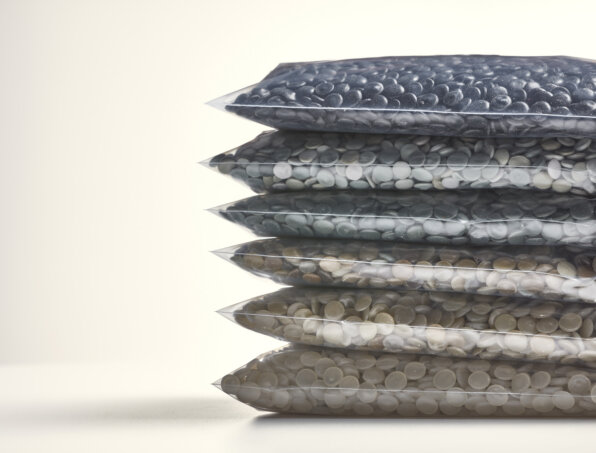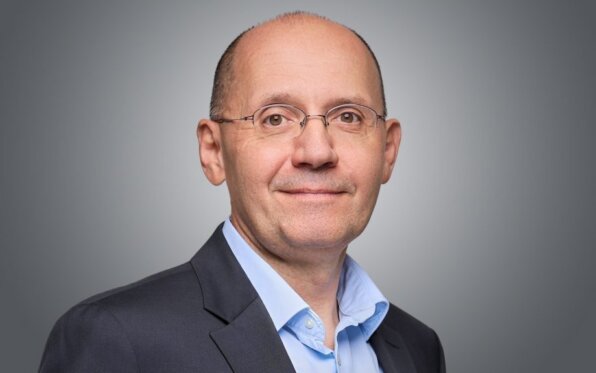Standards & Certifications
Keeping in line with industry-accepted standards
Borealis has certified its key activities in Europe at a group level for the standards ISO 9001, ISO14001 and ISO 50001. The scope of the matrix certification is the design, development, manufacturing, marketing & sales and distribution of products in the business of polyolefins and their compounds, olefins and phenol & aromatics.
In addition, Borealis is matrix-certified according to ISO 45001 for all key activities in Vienna, Linz and Schwechat (Austria), Beringen, Kallo and Mechelen (Belgium), Porvoo (Finland) and Monza (Italy). Burghausen and Piesteritz (Germany) are certified according to ILO-OSH 2001, which confirms that the ISO 45001 guidelines are implemented.
The company’s key activities in connection with the supply of raw materials to automotive customers are certified according to IATF 16949.
The company’s activities in the USA and Brazil are partly covered by the Borealis Group certificate, and partly certified locally. Borealis’ certifications in mechanical recycling are not covered by the Borealis Group certificate, but are certified locally and independently (see separate section below).
Compliance and Anti-bribery Management System Certifications
-
Vienna - Compliance and Anti-bribery Management System Certifications
Corporate . pdf . 443.8 KB -
Vienna - Compliance and Anti-bribery Management System Certifications
Corporate . pdf . 447.5 KB -
Vienna - Compliance and Anti-bribery Management System Certifications
Corporate . pdf . 442.9 KB -
Vienna - Compliance and Anti-bribery Management System Certifications
Corporate . pdf . 447.0 KB
IATF 16949
-
Taino - IATF 16949
. pdf . 462.8 KB -
Itatiba - IATF 16949
Corporate . pdf . 303.6 KB -
Taylorsville - IATF 16949
Corporate . pdf . 509.4 KB -
Rockport - IATF 16949
Corporate . pdf . 1.8 MB -
Vienna - IATF 16949
Corporate . pdf . 1.8 MB -
Schwechat - IATF 16949
Corporate . pdf . 1.8 MB -
Linz - IATF 16949
Corporate . pdf . 1.8 MB -
Monza - IATF 16949
Corporate . pdf . 1.8 MB -
Kallo - IATF 16949
Corporate . pdf . 1.8 MB -
Beringen - IATF 16949
Corporate . pdf . 1.8 MB
ISCC EU
ISCC PLUS
We offer our customers International Sustainability and Carbon Certification (ISCC PLUS) for our portfolio of mass balanced circular products. ISCC PLUS is a global certification that covers the entire supply chain, from raw material to final product, guaranteeing compliance with highest standards for environmental and social standards, creating a chain of custody.
ISCC PLUS provides traceability of recycled-based and renewable-based materials and verifies that mass balance accounting follows predefined and transparent rules.
Customers can use the certification to verify compliance with sustainability and traceability requirements.
-
Wildon - ISCC PLUS
Corporate . pdf . 427.9 KB -
Rockport - ISCC PLUS
Corporate . pdf . 991.7 KB -
Niedergebra - ISCC PLUS
Corporate . pdf . 320.5 KB -
Monza - ISCC PLUS
Corporate . pdf . 6.6 MB -
Renasci - ISCC PLUS
Corporate . pdf . 6.4 MB -
Geleen - ISCC PLUS
Corporate . pdf . 6.6 MB -
Borealis UK - ISCC PLUS
Corporate . pdf . 993.1 KB -
Stenungsund HC - ISCC PLUS
Corporate . pdf . 6.6 MB -
Antwerp - ISCC PLUS
Corporate . pdf . 6.6 MB -
Stenungsund PO - ISCC PLUS
Corporate . pdf . 6.6 MB -
Burghausen - ISCC PLUS
Corporate . pdf . 6.7 MB -
Porvoo - ISCC PLUS
Corporate . pdf . 6.6 MB -
Schwechat - ISCC PLUS
Corporate . pdf . 6.6 MB -
Beringen - ISCC PLUS
Corporate . pdf . 6.7 MB -
Kallo - ISCC PLUS
Corporate . pdf . 6.6 MB
ISO 14001
-
Wildon - ISO 14001
Corporate . pdf . 1.1 MB -
Wildon - ISO 14001
Corporate . pdf . 1.1 MB -
Taino - ISO 14001
. pdf . 159.9 KB -
Elin Pelin - ISO 14001
. pdf . 995.3 KB -
Borealis Group - ISO 14001
Corporate . pdf . 1.7 MB -
Stenungsund - ISO 14001
Corporate . pdf . 1.7 MB -
Monza - ISO 14001
Corporate . pdf . 1.7 MB -
Porvoo - ISO 14001
Corporate . pdf . 1.7 MB -
Beringen - ISO 14001
Corporate . pdf . 1.7 MB -
Linz - ISO 14001
Corporate . pdf . 1.7 MB -
Geleen - ISO 14001
Corporate . pdf . 1.7 MB -
Mechelen - ISO 14001
Corporate . pdf . 1.7 MB -
Burghausen - ISO 14001
Corporate . pdf . 1.7 MB -
Kallo - ISO 14001
Corporate . pdf . 1.7 MB -
Antwerp - ISO 14001
Corporate . pdf . 1.7 MB -
Schwechat - ISO 14001
Corporate . pdf . 1.7 MB -
Vienna - ISO 14001
Corporate . pdf . 1.7 MB -
Itatiba - ISO 14001
Corporate . pdf . 666.5 KB
ISO 17025
ISO 45001
-
Cheonan - ISO 45001
Corporate . pdf . 1.9 MB -
Taino - ISO 45001
Corporate . pdf . 161.7 KB -
Burghausen - ISO 45001
Corporate . pdf . 434.0 KB -
Borealis Group - ISO 45001
Corporate . pdf . 1.7 MB -
Monza - ISO 45001
Corporate . pdf . 1.7 MB -
Kallo - ISO 45001
Corporate . pdf . 1.7 MB -
Mechelen - ISO 45001
Corporate . pdf . 1.7 MB -
Linz - ISO 45001
Corporate . pdf . 1.7 MB -
Porvoo - ISO 45001
Corporate . pdf . 1.7 MB -
Beringen - ISO 45001
Corporate . pdf . 1.7 MB -
Schwechat - ISO 45001
Corporate . pdf . 1.7 MB -
Vienna - ISO 45001
Corporate . pdf . 1.7 MB -
Stenungsund - ISO 45001
Corporate . pdf . 1.7 MB
ISO 50001
-
Niedergebra - ISO 50001
. pdf . 333.3 KB -
Borealis Group - ISO 50001
Corporate . pdf . 1.7 MB -
Linz - ISO 50001
Corporate . pdf . 1.7 MB -
Stenungsund - ISO 50001
Corporate . pdf . 1.7 MB -
Monza - ISO 50001
Corporate . pdf . 1.7 MB -
Porvoo - ISO 50001
Corporate . pdf . 1.7 MB -
Beringen - ISO 50001
Corporate . pdf . 1.7 MB -
Mechelen - ISO 50001
Corporate . pdf . 1.7 MB -
Vienna - ISO 50001
Corporate . pdf . 1.7 MB -
Geleen - ISO 50001
Corporate . pdf . 1.7 MB -
Burghausen - ISO 50001
Corporate . pdf . 1.7 MB -
Kallo - ISO 50001
Corporate . pdf . 1.7 MB -
Antwerp - ISO 50001
Corporate . pdf . 1.7 MB -
Schwechat - ISO 50001
Corporate . pdf . 1.7 MB
ISO 9001
-
Niedergebra - ISO 9001
. pdf . 302.8 KB -
Wildon - ISO 9001
Corporate . pdf . 1.1 MB -
Wildon - ISO 9001
Corporate . pdf . 1.1 MB -
Taino - ISO 9001
. pdf . 163.8 KB -
Elin Pelin - ISO 9001
. pdf . 996.2 KB -
Borealis Group - ISO 9001
Corporate . pdf . 1.7 MB -
Taylorsville - ISO 9001
Corporate . pdf . 1.7 MB -
Stenungsund - ISO 9001
Corporate . pdf . 1.7 MB -
Monza - ISO 9001
Corporate . pdf . 1.7 MB -
Porvoo - ISO 9001
Corporate . pdf . 1.7 MB -
Beringen - ISO 9001
Corporate . pdf . 1.7 MB -
Mechelen - ISO 9001
Corporate . pdf . 1.7 MB -
Linz - ISO 9001
Corporate . pdf . 1.7 MB -
Rockport - ISO 9001
Corporate . pdf . 1.7 MB -
Geleen - ISO 9001
Corporate . pdf . 1.7 MB -
Burghausen - ISO 9001
Corporate . pdf . 1.7 MB -
Kallo - ISO 9001
Corporate . pdf . 1.7 MB -
Antwerp - ISO 9001
Corporate . pdf . 1.7 MB -
Schwechat - ISO 9001
Corporate . pdf . 1.7 MB -
Vienna - ISO 9001
Corporate . pdf . 1.7 MB -
Itatiba - ISO 9001
Corporate . pdf . 334.2 KB
OCS Europe
-
Geleen - OCS Europe
Corporate . pdf . 1.7 MB -
Beringen - OCS Europe
Corporate . pdf . 1.7 MB -
Porvoo - OCS Europe
Corporate . pdf . 105.4 KB -
Stenungsund - OCS Europe
Corporate . pdf . 412.0 KB -
Kallo - OCS Europe
Corporate . pdf . 424.0 KB -
Antwerp - OCS Europe
Corporate . pdf . 424.2 KB -
Schwechat - OCS Europe
Corporate . pdf . 81.5 KB -
Monza - OCS Europe
Corporate . pdf . 417.0 KB -
Linz - OCS Europe
Corporate . pdf . 102.0 KB -
Burghausen - OCS Europe
Corporate . pdf . 81.4 KB
RecyClass Recycling Process
RecyClass Traceability
Antwerp
Beringen
Borealis Group
Borealis UK
Burghausen
Cheonan
Elin Pelin
Geleen
Itatiba
Kallo
Linz
Mechelen
Monza
Niedergebra
Porvoo
Renasci
Rockport
Schwechat
Stenungsund
Stenungsund HC
Stenungsund PO
Taino
Vienna
-
Compliance and Anti-bribery Management System Certifications - Vienna
pdf . 443.8 KB -
Compliance and Anti-bribery Management System Certifications - Vienna
pdf . 447.5 KB -
Compliance and Anti-bribery Management System Certifications - Vienna
pdf . 442.9 KB -
Compliance and Anti-bribery Management System Certifications - Vienna
pdf . 447.0 KB -
TISAX - Vienna
pdf . 3.2 MB -
ISO 50001 - Vienna
pdf . 1.7 MB -
ISO 45001 - Vienna
pdf . 1.7 MB -
IATF 16949 - Vienna
pdf . 1.8 MB -
ISO 14001 - Vienna
pdf . 1.7 MB -
ISO 9001 - Vienna
pdf . 1.7 MB
Borealis' Certifications in Mechanical Recycling
The acquisitions of recycling companies mtm plastics, Ecoplast and Integra are milestones on Borealis’ journey towards achieving circularity of polyolefins. They signify the company’s strategic intention to become a leader in mechanical recycling technologies and, in so doing, to increase the overall recycling rate and actively drive the circularity of polyolefins.
Downloads
-
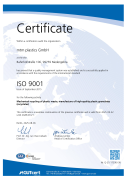
MTM ISO 9001
pdf. 296kb .English -
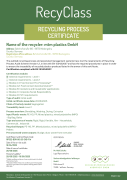
MTM RecyClass Certificate - Recycling Process
pdf. 219kb .English -
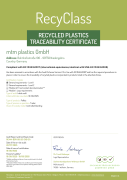
MTM RecyClass Certificate - Traceability
pdf. 190kb .English -
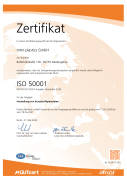
MTM ISO 50001
pdf. 326kb .German -
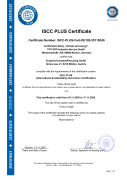
Ecoplast ISCC PLUS Certificate
Certification.pdf. 418kb .English -
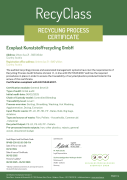
Ecoplast RecyClass Certificate 2025
pdf. 140kb .English -
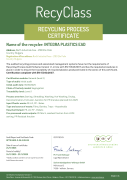
Integra RecyClass Certificate - Recycling Process
pdf. 984kb .English -
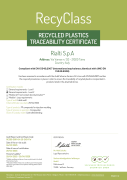
Rialti SpA RecyClass Certificate - Traceability
pdf. 130kb .English -
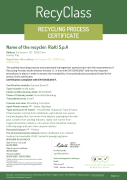
Rialty SpA RecyClass Certificate - Recycling Process
pdf. 136kb .English
